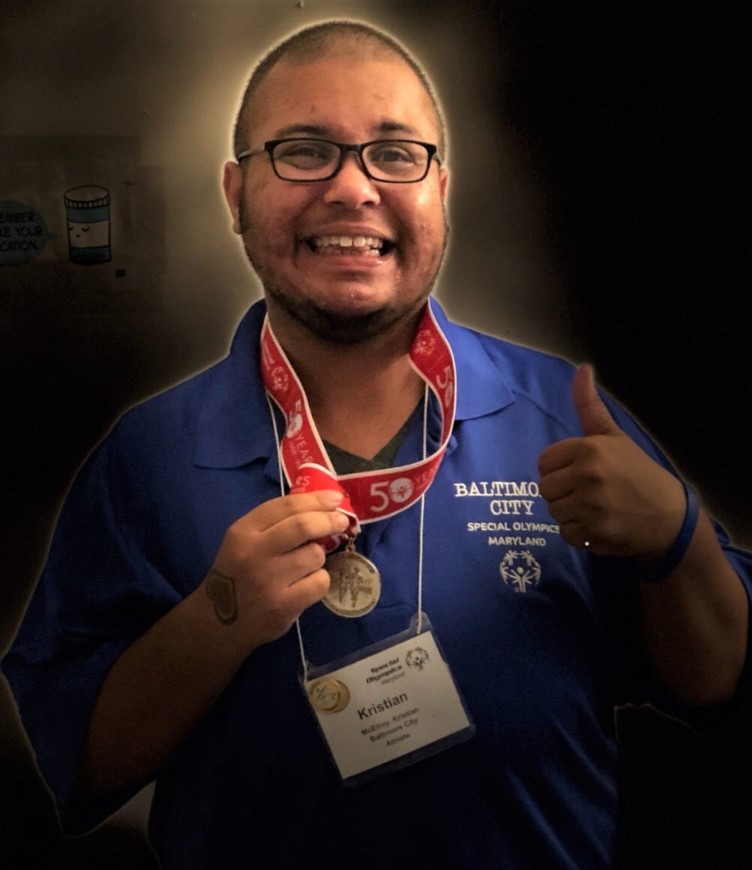Diverse Faces of Dementia – Kris McElroy
At age 33, Special Olympian, Kris McElroy has already overcome more of life’s obstacles than many of us can imagine. Born with progressive neuromuscular disorder that makes it difficult to do what many of us take for granted, he went on to pursue his PhD, stopping in his second year after he was diagnosed with dementia.

I Always Found A Way
Kris writes, “Even though I had challenges all my life… I always bounced back or found a way.”
He worked from age 16 to 29 as an elementary school teacher, an independent contractor, a coordinator for a nonprofit, and an activity leader for an Alzheimer’s and dementia assisted living facility.
“I wasn’t used to the changes I experienced in spelling, driving, ability to edit, ability to comprehend things, keep track of things, navigating, ability to multitask, and the level of confusion.”
As his physical abilities worsened, he was in and out of the hospital. In 2015, Kris was diagnosed with “mild to moderate neurocognitive disorder” – a less-stigmatizing and more accurate term for younger-onset dementia. Despite the diagnosis, the doctors were not convinced. They attributed his symptoms to stress. After all, Kris was too young to have dementia! And then a neurologist tested him in June of 2017. At age 32 and only four months before his 33rd birthday, he was diagnosed once again, with dementia.
In his closing remarks for a piece sent to Dementia Alliance International, Kris wrote, “I am a 33-year old chef, artist, writer, volunteer, educator, Special Olympian and athlete with dementia and other health conditions who has good days and bad days determined to live life well and each moment to the fullest.”
Interview Highlights
- When life presents obstacles, follow a different set of rules.
- Friends become family.
Kris’s best friend Hollie is more like a sister to him. She looks out for and helps him when he needs it; otherwise, he lives alone. - The significance of the picture of Mona Lisa and the boy on the chair behind Kris…
His answer will surprise you! - Directing limited energy.
How can someone so young offer such wisdom? We must heed his words. - When people question his dementia diagnosis.
Thank you, Dementia Alliance International Board Member, Phyllis Fehr, for introducing The Caregiver’s Voice to Kris McElroy.
Keep up with Kris McElroy at his Facebook page.









First of all, I want to thank Phyllis for giving Kris this opportunity to speak about and share his experiences. In a world that so often either overlooks his struggles or minimizes them, it is wonderful to have this platform to give him a voice. As Kris’s main caregiver, I, too, find it hard to explain Kris’s early onset dementia. People want to judge, instead of try to be compassionate. They chalk his behavior up to stress, or some time of mental illness. They do not see the inner turmoil he exists in each day.
Recently, at a community health fair, I was given the opportunity to participate in a virtual dementia emersion activity. The goal of the experience was to give an individual some of the experiences individuals in Kis’s position would be dealing with on a daily basis. They put prickly things in my shoes, large wool gloves on my hands, glasses with distorted lenses, and headphones with loud voices speaking all together (as well as loud bangs and sirens to startle me even more.) I couldn’t see. I couldn’t hear what anyone was trying to tell me. They gave me instructions I couldn’t hear, put me in a dim room with written instructions I was supposed to follow. I could read the instructions because of the glasses. When I could read them, the gloves made it impossible for me to do the tasks, There was a woman in the room who wouldn’t help me. I found myself wandering around the room, trying to figure out what I was supposed to be doing, but unable to figure it out. I just wanted to curl up on the floor and cry. When they brought me out of the dim room and took me into another room to rebrief, I did cry
That is what dementia feels like. Kris deals with many of these things on a daily basis in various forms. He is so brave, so strong, so determined; however, if asked, he doesn’t know or understand why. I hope you got an understanding of Kris’s outlook though the watching of this video, because, despite all of the things he’s experienced, he keeps a smile on his face, day by day, moment by moment. Because that’s all he has. Thank you for taking the time to give him this voice.
I have goosebumps reading your comments, Hollie.
Thank you for taking the time to share.
Yes, with enough compassion we can help people with dementia live long purposeful lives…
without compassion, we cause people with dementia to curl up and cry and even prematurely die.
Reading your immersion experience and the effect it had on you was powerful, Hollie!
Again, thank you.
Brenda